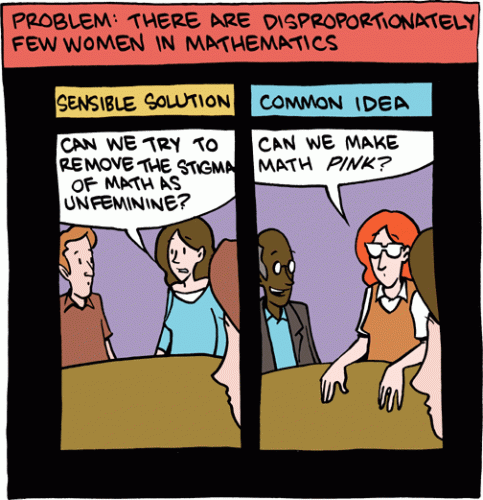Doing Good to Make Us Better
“It’s such a transformative field for society as a whole. And without the involvement of a diverse group of people, the results of what we do are not going to be appealing or useful to all aspects of our society. A piece of our challenge is to make computing, and all that it enables, accessible to everyone. That’s an ideal.”

The lack of women in computing is generally an issue that universities have taken a great interest in. Many of them have outreach programs for high school aged women and other minorities in the computing field. However, every single one of us in the community can take ownership of this issue and do something to improve it. Making computer science pink won’t increase the number of women, instead, we need to build up support and encouragement for all students.
1. Encourage others to embrace any interest in computing they may have
It’s important that we encourage others with any sort of interest in the field to embrace it and learn. It’s also important to keep in mind that we shouldn’t isolate this encouragement to just young students, but older students as well who are looking for new ways of thinking. Speak to the pervasiveness of this technology. Share your love of your field with someone else. Dismantle the image of the programmer coding alone in the dark [2].
2. Contribute to projects that help learners
Learning to program can be a daunting task and the first exposure can greatly effect how anyone feels about the computing field on the whole [3]. However, programmers have been working on projects in order to make it a little bit easier for everyone. These projects require all the help they can get if they are to successfully educate. Not just from fellow programmers to help write the code and fix bugs, but from writers and artists who can help make the information easy to read and clearly designed. Hackety Hack is an amazing project used by young and old learners alike, but it needs the assistance of the community in order succeed.
3. Mentor
Mentors need to step up and help the new generation of learners on their way. Assist a student with a project, or peer program a project with a student. “Becoming a Computer Scientist” laments the lack of female mentors for incoming students [4], but there is no reason why anyone in the community cannot mentor another student. The community needs more role models for learners and less “rockstar” developers. Coding should not be a lonesome experience. It’s easier to learn and keep learning when you have a support system behind you driving you forward.
4. Create a culture that makes people want to stay
One people are actually involved in the field we need to take steps in order to keep them there. The programming culture should remain open to all people. We should embrace new people and not shun someone because they haven’t been programming since age 5. We should spend less time infighting and more time supporting each-others’ goals. We need to focus in on equality and move past previous mistakes.
The community must take ownership of the problem if we wish to resolve it. We must encourage people to enter the computing field and be there to support them once that interest develops. Fellow programmers need to step up and be there to help students push themselves. Discussing the issue will not solve the issue. We must take action in order to resolve the problem.
Updated: 8.24.2011 17:39
References:
- Coders at Work by Peter Seibel
- Who’s the Scientist?
- The Litter Coder’s Predicament by whytheluckystiff
- Amy Pearl, Martha E. Pollack, Eve Riskin, Becky Thomas, Elizabeth Wolf, and Alice Wu. 2002. Becoming a computer scientist. SIGCSE Bull. 34, 2 (June 2002), 135-143. http://doi.acm.org/10.1145/543812.543847
- Saturday Morning Breakfast Cereal
- Vanessa Hurst: Why Software Developers Rock
